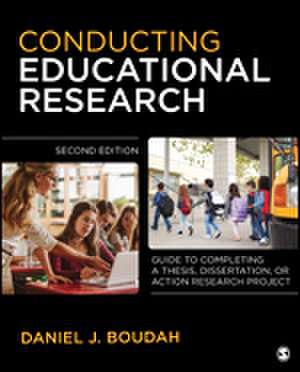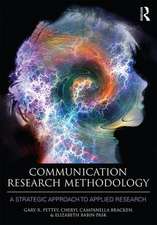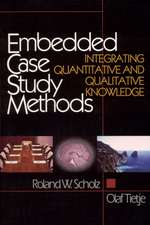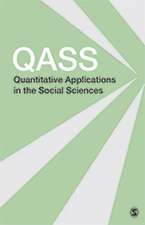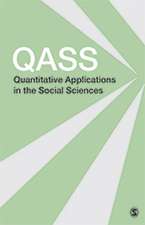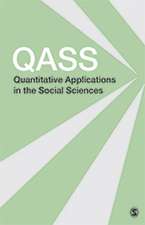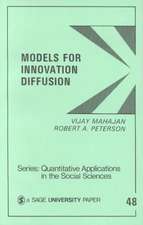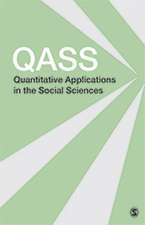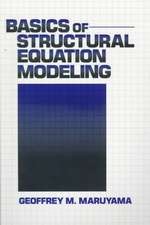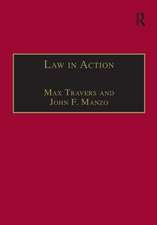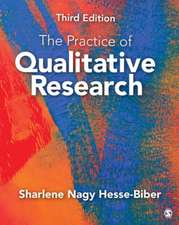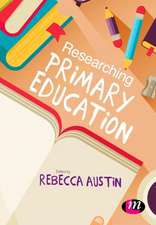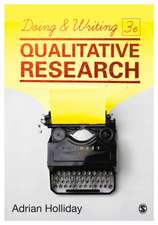Conducting Educational Research: "Guide to Completing a Thesis, Dissertation, or Action Research Project"
Autor Daniel Joseph Boudahen Limba Engleză Paperback – 6 noi 2019
Preț: 537.23 lei
Preț vechi: 725.99 lei
-26% Nou
102.80€ • 109.93$ • 85.71£
Carte disponibilă
Livrare economică 27 martie-10 aprilie
Livrare express 12-18 martie pentru 30.85 lei
Specificații
ISBN-10: 1544351690
Pagini: 304
Dimensiuni: 187 x 232 x 15 mm
Greutate: 0.52 kg
Ediția:Second Edition
Editura: SAGE Publications
Colecția Sage Publications, Inc
Locul publicării:Thousand Oaks, United States
Cuprins
Acknowledgments
Chapter 1 • Research in Education
Conducting Research in Education: Art or Science?
The Current Research-to-Practice Gap
Examples of Research at the Policy and Classroom Levels
Research Types, Designs, and Methodologies
Selected Organizations That Support Research in Education
Putting It All Together
Summary
Activity
Your Research Project in Action
Further Reading
References
Activity Answers
Chapter 2 • Identifying a Research Problem and Question, and Searching Relevant Literature
Identifying a Research Problem
Identifying a Possible Research Question
The Purposes of a Literature Review
The Process of Conducting a Literature Search
Putting It All Together
Summary
Discussion Questions
Your Research Project in Action
Further Reading
References
Chapter 3 • Understanding Relevant Literature and Writing a Literature Review
Analyzing Literature Search Outcomes
Writing a Literature Review
Revisiting and Revising Research Questions
Putting It All Together
Summary
Check Sheet for Understanding Relevant Literature
Discussion Questions
Your Research Project in Action
Further Reading
References
Literature Examples
Chapter 4 • Issues in Validity and Reliability
What Are Validity, Trustworthiness, and Reliability?
Types of Validity and Their Threats
Reliability
Trustworthiness
Ways to Address Challenges to Trustworthiness
Putting It All Together
Summary
Discussion Questions
Your Research Project in Action
References
Literature Examples
Chapter 5 • Designing and Conducting Experimental Research
Experimental and Quasi-Experimental Research
Questions Point to Designs
Group Designs
Single-Subject Designs
Measurement of Dependent Variables
Types of Data
Putting It All Together
Summary
Discussion Questions
Your Research Project in Action
Further Reading
References
Literature Examples
Chapter 6 • Designing and Conducting Qualitative Research
What Is Qualitative Research?
Qualitative Design: The Planning Process
Putting It All Together
Summary
Discussion Questions
Your Research Project in Action
Further Reading
References
Literature Examples
Chapter 7 • Designing and Conducting Descriptive Research
Types of Quantitative Descriptive Research
Survey Methods
Conducting Descriptive Research
Accessing Extant Databases
Mixed Methods Research
Putting It All Together
Summary
Discussion Questions
Your Research Project in Action
Further Reading
References
Literature Examples
Chapter 8 • Creating a Research Proposal
The Purpose of a Research Proposal
Identifying a Problem
Investigating and Identifying Relevant Literature
Identifying a Research Question
Identifying a Research Design and Method
Identifying Research Procedures and Plans
Identifying Potential Analyses
Protection of Human Participants
Pilot Testing
Putting It All Together
Summary
Discussion Questions
Your Research Project in Action
Further Reading
References
Literature Examples
Chapter 9 • Analyzing and Interpreting Experimental Research
Experimental Data
Selecting a Statistic Consistent With Your Design and Appropriate to Your Data
Interpreting the Results of Analyses
Discussing Experimental Results
Statistical Conclusion Validity
Putting It All Together
Summary
Discussion Questions
Your Research Project in Action
Further Reading
References
Literature Examples
Chapter 10 • Analyzing and Interpreting Qualitative Data
Data Management
Data Analysis
Trustworthiness
Documenting and Reporting Results
Putting It All Together
Summary
Discussion Questions
Your Research Project in Action
Further Reading
References
Literature Examples
Chapter 11 • Analyzing and Interpreting Descriptive Research
Descriptive Data Analysis and Interpretation
Correlational Research
Causal Comparative Research
Mixed Methods Research
Putting It All Together
Summary
Discussion Questions
Your Research Project in Action
Further Reading
References
Literature Examples
Chapter 12 • Writing Research Reports
Writing for Publication
Getting Your Writing Published
Putting It All Together
Summary
References
Literature Examples
Appendix A: Organizations That Support Educational Research
Appendix B: Using Microsoft® Excel to Analyze Data
Glossary
Index
About the Author
Notă biografică
Daniel J. Boudah is a Professor in the Department of Special Education, Research & Foundations, and a former departmental Director of Graduate Studies at East Carolina University. Dr. Boudah previously taught general education and special education in public schools. He has been awarded federal and other grants and carried out school-based research in the areas of teacher planning and inquiry, learning strategies, content enhancement, systems change, and collaborative instruction. He has published work in professional journals, textbooks, newsletters, and teacher-training materials. Dr. Boudah has spoken at numerous national, international, and state conferences. He has received awards for excellence from several organizations in the field of education. Dr. Boudah has conducted many professional development, curriculum design, program evaluation, grant and foundation proposal development, and system change activities with public and private schools, as well as public and private agencies, to develop and support services to low-performing and at-risk students. He is a past president of the Council for Learning Disabilities. Dr. Boudah¿s continuing professional interests include programs and services for low-performing students and students with disabilities, learning and instructional strategies, dropout prevention, and systems change. Dr. Boudah can be reached at boudahd@ecu.edu
